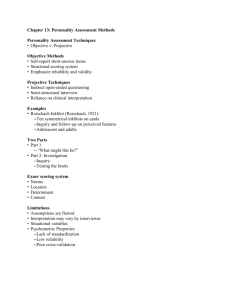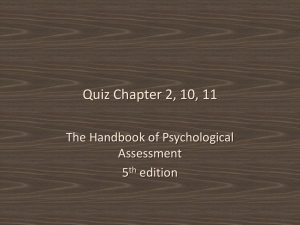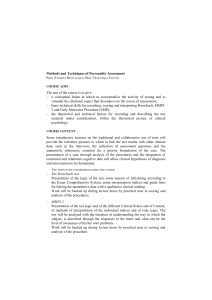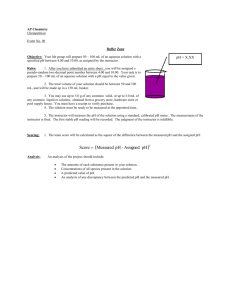Psyc 811 002 Meier - Courses and Syllabi
advertisement
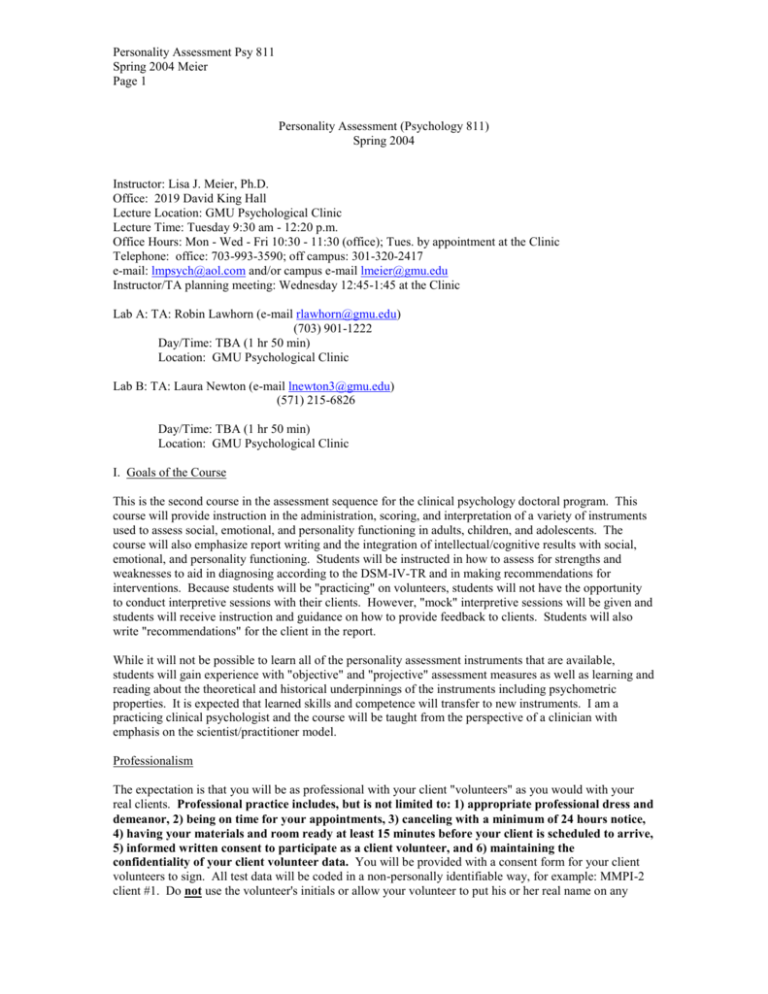
Personality Assessment Psy 811 Spring 2004 Meier Page 1 Personality Assessment (Psychology 811) Spring 2004 Instructor: Lisa J. Meier, Ph.D. Office: 2019 David King Hall Lecture Location: GMU Psychological Clinic Lecture Time: Tuesday 9:30 am - 12:20 p.m. Office Hours: Mon - Wed - Fri 10:30 - 11:30 (office); Tues. by appointment at the Clinic Telephone: office: 703-993-3590; off campus: 301-320-2417 e-mail: lmpsych@aol.com and/or campus e-mail lmeier@gmu.edu Instructor/TA planning meeting: Wednesday 12:45-1:45 at the Clinic Lab A: TA: Robin Lawhorn (e-mail rlawhorn@gmu.edu) (703) 901-1222 Day/Time: TBA (1 hr 50 min) Location: GMU Psychological Clinic Lab B: TA: Laura Newton (e-mail lnewton3@gmu.edu) (571) 215-6826 Day/Time: TBA (1 hr 50 min) Location: GMU Psychological Clinic I. Goals of the Course This is the second course in the assessment sequence for the clinical psychology doctoral program. This course will provide instruction in the administration, scoring, and interpretation of a variety of instruments used to assess social, emotional, and personality functioning in adults, children, and adolescents. The course will also emphasize report writing and the integration of intellectual/cognitive results with social, emotional, and personality functioning. Students will be instructed in how to assess for strengths and weaknesses to aid in diagnosing according to the DSM-IV-TR and in making recommendations for interventions. Because students will be "practicing" on volunteers, students will not have the opportunity to conduct interpretive sessions with their clients. However, "mock" interpretive sessions will be given and students will receive instruction and guidance on how to provide feedback to clients. Students will also write "recommendations" for the client in the report. While it will not be possible to learn all of the personality assessment instruments that are available, students will gain experience with "objective" and "projective" assessment measures as well as learning and reading about the theoretical and historical underpinnings of the instruments including psychometric properties. It is expected that learned skills and competence will transfer to new instruments. I am a practicing clinical psychologist and the course will be taught from the perspective of a clinician with emphasis on the scientist/practitioner model. Professionalism The expectation is that you will be as professional with your client "volunteers" as you would with your real clients. Professional practice includes, but is not limited to: 1) appropriate professional dress and demeanor, 2) being on time for your appointments, 3) canceling with a minimum of 24 hours notice, 4) having your materials and room ready at least 15 minutes before your client is scheduled to arrive, 5) informed written consent to participate as a client volunteer, and 6) maintaining the confidentiality of your client volunteer data. You will be provided with a consent form for your client volunteers to sign. All test data will be coded in a non-personally identifiable way, for example: MMPI-2 client #1. Do not use the volunteer's initials or allow your volunteer to put his or her real name on any Personality Assessment Psy 811 Spring 2004 Meier Page 2 document. You pre-label all test protocols with your code for that client. Unprofessional conduct will result in a decrease in your grade. If you have any questions, consult the instructor, your TA, or the APA ethics code. I. Readings Required American Educational Research Association, American Psychological Association, National Council on Measurement in Education, (1999). Standards for educational and psychological testing. American Psychological Association (2002). Ethical principals of psychologists and code of conduct. American Psychologist, 57, 1060-1073. Also available at http://www.apa.org/ethics/ Aronow, E., Weiss, K. A., & Reznikoff, M. (2001). A practical guide to the Thematic Apperception Test: The TAT in clinical practice. Ann Arbor, MI: John Wiley & Sons. Exner, J. E., Jr. (2000). A primer for Rorschach interpretation. Ashville, NC: Rorschach Workshops. Exner, J. E., Jr. (2001). A Rorschach workbook for the comprehensive system (5th ed.). Ashville, NC: Rorschach Workshops. Greene, R. L. (2000). The MMPI-2: An interpretive manual (2nd ed.). Boston: Allyn and Bacon. Hersen, M., & Turner, S. M. (2003). Adult psychopathology and diagnosis (4 th ed.). Hoboken, NJ: Wiley & Sons. (Chapters 1 and 3) Kamphaus, R. W., & Frick, P.J. (2001). Clinical assessment of child and adolescent intelligence (2 nd ed.). Boston: Allyn and Bacon. (for reference and report writing). Kamphaus, R. W., & Frick, P. J. (2002). Clinical assessment of child and adolescent personality and behavior (2nd ed.). Boston: Allyn and Bacon. Kellerman, H., & Burry, A. (1997). Handbook of psychodiagnostic testing: Analysis of personality in the psychological report (3rd ed.). Boston: Allyn and Bacon. Morey, Leslie C. (2003). Essentials of PAI Assessment. Hoboken, NJ: John Wiley & Sons. Murray, H. A. (1971). Thematic Apperception Test Manual. Cambridge: Harvard University Press. Additional readings may be assigned throughout the semester at the discretion of the instructor. Recommended for Your Personal Library Adams, R. L.; Parsons, O. A., Culbertson, J. L., & Nixon, S. J. (Eds.). (1996). Neuropsychology for clinical practice. Washington, D.C.: American Psychological Association. Butcher, J. N. (Ed.). (2002). Clinical personality assessment: Practical approaches. New York: Oxford University Press. Exner, J. E., Jr. (2002). The Rorschach: A comprehensive system (Vol. 1), (4 th ed.). New York: John Wiley & Sons. Goleman, D. (1994). Emotional intelligence: Why it can matter more than IQ. New York: Bantam Books. Personality Assessment Psy 811 Spring 2004 Meier Page 3 Millon, T. (1996). Disorders of personality: DSM-IV and beyond (2nd ed.). New York: John Wiley & Sons. (Chapters 1 and 4 recommended for this semester). The Interdisciplinary Council on Developmental and Learning Disorders, (2000). Clinical practice guidelines: Redefining the standards of care for infants, children, and families with special needs. Bethesda, MD: ICDL. III. Course Structure, Requirements, and Grading This course includes a scheduled weekly lecture and a scheduled weekly lab component, as well as test administration requirements that will be completed outside of scheduled class and lab time. Lab The lab component will be used to teach and to reinforce test administration, scoring, and some interpretation. Your TA will also give you feedback on your report writing and interviewing skills. The work you submit to your TA will be graded as Satisfactory or Unsatisfactory. Unsatisfactory work must be done over until it is Satisfactory. I will help the TAs to determine the criteria for Satisfactory performance. You are expected to come to lab on time and prepared. Attendance, preparation, and participation in lab will be part of your final grade. There will be a lab fee of $75.00 for lab test materials. Please bring your check the first week of class made payable to George Mason University. Lecture Attendance, preparation, and participation in lecture will be part of your final grade. The lecture component of the course will include review of psychodiagnostic interviewing, instruction in the theory of psychological assessment of personality and social/emotional functioning, instruction and practice in test administration, scoring, and interpretation, instruction and practice in the integration of client data, report writing, and the essentials of professional practice. Lecture will also be used clarify and to expand upon material in the readings, answer questions, and encourage you to help each other expand your knowledge and skills. Class Presentations In addition to the interviewing, test administration, scoring, interpretation, and report writing requirements of the course, lecture will include graded presentations by each student. 1. Article review: Each student is required to select one recent (1998 - 2004) article from an accredited journal to review and to present to the class. Your write-up will be two to three typed pages (APA format). Guidelines for your article review will be provided under separate cover. The article must be related to the field of personality, social, emotional, or behavioral assessment. You may select an article that investigates a specific instrument (eg. validity of a particular instrument for a specific population) or an article that investigates an important topic in personality assessment. In addition to the write up that will be handed in to the instructor, you will present your critique to the class including a brief discussion of how the article may have influenced you as a practicing clinician. Dates for presentation will be assigned once you have turned in your selected article to the instructor. 2. Case presentations: Each of you will be required to present data from your clients in the form of a case presentation. When it is your turn to present, you must come to class with enough copies of your data for everyone in the class, information from your diagnostic clinical interview, and your diagnostic impressions with evidence from your data to support them. Remember to think "strengths" as well as weaknesses when thinking about your client volunteers. The class will help with interpretation and you may include the class information in your written report. Personality Assessment Psy 811 Spring 2004 Meier Page 4 3. Exams: Formal exams will not be emphasized in this course. You must complete and comprehend the reading assignments in order to perform well on your test administrations and report writing. Quizzes, either in class or take home, will be given periodically to assess your understanding of the readings and lectures. A formal mid-term or final exam is optional at the instructor's discretion should it seem necessary in order to evaluate your mastery of the material and of the necessary skills. 4. Test Administrations: You will be required to complete the following test administrations with scoring, interpretation, and report writing to be counted as a significant portion of your final grade. Listed below are the minimum requirements. If you need additional practice in order to reach a level of sufficient skill to assess "real" clients, additional administrations will be assigned until you can successfully complete the course. Reports of individual or collective tests will include background information and behavioral observations. You may use the same client for more than one test. Test # Administrations MMPI-2/A (Minnesota Multiphasic Personality Inventory) PAI (Personality Assessment Inventory) BDI -II (Beck Depression Inventory) Beck Hopelessness Scale BAI (Beck anxiety Inventory) Rorschach Inkblot Test TAT/Roberts (Thematic Apperception Test) Bender Gestalt Test Projective Drawings (Kinetic Family Drawing; Draw a Person; House-Tree Person) Incomplete Sentences # Scoring # Interpretations/ Reports 3 (2 adult 1 adolescent) 3 2 2 3 (2 on your own; 1 with computer program) 2 3 3 3 3 3 3 3 3 3 3 (2 adult, 1 child /adolescent) 3 3 (2 adult 1 child /adolescent) 3 (Qualitative) 3 (2 on your own; 1 with computer program) 3 3 3 3 3 (1 adult, 2 child / adolescent) 0 3 3 (2 adult 1 child) 1 BASC * 1 1 1 Conners PRS * 1 1 1 CBCL * 1 1 1 Piers-Harris Children's Self Concept Scale CDI (Children's Depression Inventory) RCMAS (Revised Children's Manifest anxiety Scale) 3 3 3 3 3 3 3 3 3 Personality Assessment Psy 811 Spring 2004 Meier Page 5 Brown ADD or Adult Self-Report 2 2 2 The list of tests above includes those to be incorporated into the following comprehensive assessments that include a clinical interview. 1) 1 adult with an IQ test, an MMPI or PAI; and a TAT or Rorschach with symptom inventories and a self-report scale; 2) 1 adult with an MMPI or PAI, and a TAT or Rorschach with self-report scale and Symptom Inventories; 3) 1 child/younger adolescent with an IQ test; MMPI-A or Piers-Harris and symptom checklists; CBCL or BASC; TAT/Roberts or Rorschach; Drawings. If you have achievement as well as intellectual data for a child or adult from last semester you are encouraged to integrate the achievement data into the report as well. If you do not have access to a client from last semester, you must also administer an IQ test to a child and an adult this semester for your full psychodiagnostic assessments. Note: Only one of the adult full assessments must include a measure of intellectual or cognitive functioning. Tests with an * were covered in PSYC 810 and will receive less emphasis this semester. You may use an intellectual assessment client from last semester as part of your comprehensive assessment. You may combine personality assessment data over the course of the semester for a full assessment. All of the data for any write-up must obviously come from the same client. You must conduct a minimum of three new diagnostic interviews with adults and two new interviews for children or adolescents this semester. For child and adolescent clients, you must also interview the child. IV. Tentative Schedule of Lecture Topics and Reading Assignments. Please bring your Exner workbook and Primer, to class with you and your MMPI-2 and PAI books to class with you every day that those topics are covered in lecture. Reports due to instructor include background, behavioral observations and test results. You would already have turned in background, behavioral observation, and scoring to your TA. Personality Assessment Psy 811 Spring 2004 Meier Page 6 DATE Jan. 20 Jan 27 TOPIC Introduction Self-Report Inventories/"Objective" Assessment Instruments Overview of Course; Overview of Personality Assessment; How to Select Instruments/the Referral Question; The Diagnostic Interview; Behavioral Observations/Conditions of Assessment as Data.; Introduce MMPI-2 and PAI MMPI-2 Interpretation READINGS ASSIGNMENT DUE Kellerman & Burry, Ch. 1-3; 11-13 Kamphaus & Frick Ch. 1-5; 14. Standards (AERA/APA) Greene Ch. 1&2 Morey Ch. 1-3 Greene Ch. 1-6; 9 MMPI-2 #1 administration already scored Students present data for interpretive practice. Article for review must be turned in to instructor on this date. Review is not due, just a copy of the article. Feb 3 MMPI-2 Interpretation Greene Ch.7, 8, 10 MMPI-2 # 1 report due to instructor; Student present MMPI-2 data for interpretive practice Feb 10 PAI Interpretation Morey Ch. 4-10 PAI #1 data for interpretive practice. Article review paper due to instructor. Feb 17 PAI Interpretation Morey Ch. 4-10 MMPI-2 # 2 with drawings and sentences report due to instructor. Student presents PAI Personality Assessment Psy 811 Spring 2004 Meier Page 7 data for interpretation practice. Feb 24 Symptom Inventories/ Parent and Teacher Rating Scales BDI-II manual; BAI manual; RCMAS manual Piers-Harris manual BDI; BAI; Hopelessness Scale; CDI; RCMAS; Piers-Harris; CBCL/TRF; Conners'; Brown ADD: Interpretation of self-report and symptom inventories Kamphaus & Frick Ch. 6-8; 15; 18; 19 PAI #1 report due to instructor. TAT Administration Kamphaus & Frick, Ch.11 Kellerman & Burry 8-15 Aronow Ch. 1-4 Exner Primer Exner Workbook By this date you should know who your full assessment clients will be so that you can plan your administrations. You may re-use test data that is turned in as part of mini reports as long as it is all from the same client. Sentences; Drawings; Bender administration; Rorschach administration Exner Primer Ch. 1; Exner Workbook Ch. 1 Aronow Ch.1,2, 4, 6; 9 "Projective" Assessment Instruments March 2 PAI #2 with sentences and Bender report due to instructor. Student presents TAT data for interpretation practice. March 16 Rorschach/TAT/MMPI interpretation: Anxiety and Affect in test data Exner Primer Ch. 4 Exner Workbook Ch. 2-5 Aronow Ch. 3 MMPI-2/A # 3 with Bender and Sentences due to instructor. Student presents data for interpretation practice. March 23 Rorschach/TAT/MMPI Stress and impulse control; defense mechanisms Aronow Ch.5 ; Kellerman & Burry Ch. 9-11 Exner Primer Ch. 2-3 Exner Workbook TAT #1 report with symptom inventories and self report scale due to instructor. Student presents data for interpretation practice. Personality Assessment Psy 811 Spring 2004 Meier Page 8 March 30 Rorschach/TAT/MMPI reality testing; ideation Aronow Ch.; Exner Primer Ch. 5-7 Exner Workbook Kellerman & Burry Ch. 4-5 Rorschach # 1 report with symptom scales and self-report measure due to instructor. Also, report on child projective drawings and self-report scales due to instructor. Student presents data for interpretation practice. April 6 Rorschach/TAT/MMPI Self Perception and Identity; Interpersonal Functioning Aronow Ch. 5 & 7 Exner Primer Ch. 8-9 Exner Workbook Kellerman & Burry Ch.12-13 Morey Ch. 6-10 TAT #2 with symptom scales report due to instructor. Full Assessment #1 due to instructor April 13 All Instruments Integrating Data Diagnostic Impressions; Feedback Exner Primer Ch. 10 Exner Workbook Aronow Ch.8 Kellerman & Burry Ch 2,1416 Kamphaus & Frick Ch. 16-17 Rorschach report # 2 due to instructor; April 20 All Instruments Integrated Interpretation and Report Writing Kellerman & Burry Ch. 2 & 16 Kamphaus & Frick Ch. 17 Child TAT/Roberts with Bender and parent report scale due to instructor. April 27 The interrelationship among cognitive and social/emotional development and personality functioning Kellerman & Burry Ch. 6-7; Aronow Ch. 7 Child Rorschach #3 with parent report scale and self-report symptom scales due to instructor. May 1 No class May 7 Child symptom scales, parent report, and projective drawings report due to instructor. Full Assessment # 2 due to instructor Full Assessment #3 due to instructor Personality Assessment Psy 811 Spring 2004 Meier Page 9 V. Tentative Schedule for Lab: In Lab Work, Readings, and Assignments Due Please bring your MMPI-2 book, PAI book, and your Exner workbook to lab on the days when those tests will be covered. When an administration is due in lab, this includes the scored protocol as well as the written background information and behavioral observations. Is does not include a written interpretive report of the test results. You must double check your own scoring and I strongly recommend that you have a class mate check your scoring before you turn it in to your TA. The TA will provide feedback on your scoring, background, and behavioral observations. You will need to begin writing up your test results section before getting your scoring feedback so that your report can be handed in to the instructor on time. Interviews must be audiotaped and turned in to your TA with your administration. You will receive feedback on your audiotapes. You must audiotape at least three adult interviews and two parent/child interviews this semester so plan accordingly. COPY ALL PROTOCOLS AND REPORTS BEFORE TURNING THEM IN TO YOUR TA. YOU WILL NEED THEM FOR CLASS! Week of Mon. Jan 19 Lab 1 Jan 26 Readings/Focus MMPI-2 and MMPI-A Administration and Scoring of all; of the scales; brief overview of validity indexes and clinical scales; structural summary (Greene Ch. 1-5); Note: et al means with background and behavioral observations written up but not test results. PAI Administration and Scoring; Scoring of all of the scales MMPI-2 #1 administration & scoring due with background, behavioral observations Lab 2 (PAI Manual; Morey Ch. 1-6) Feb. 2 Lab 3 Assignment Due MMPI-2/A and PAI Scoring review; MMPI-2/A supplementary scales, critical items (Greene Ch. 6) PAI #1 administration due with scoring, background, and behavioral observations PAI Treatment Scales and Interpersonal Scales (Morey Ch. 6-10) Feb 9 Administration, scoring and interpretation of Symptom Inventories and Parent /Teacher report forms: Lab 4 BDI; BAI; Hopelessness Scale; CDI; RCMAS; PiersHarris; CBCL/TRF; BASC; Conners'; Brown, ASR Manuals for BDI-II; BAI; RCMAS and review of others as needed. Feb 16 Lab 5 MMPI and PAI; Symptom Inventories; Self -Report; Parent and Teacher Report forms review administration, scoring and interpretation as needed. If time, begin Rorscach overview. MMPI-2/A #2 administration due with scoring, background, and behavioral observations; with adult projective drawings and adult incomplete sentences. PAI #2 administration due with scoring et al. and Bender and Incomplete Sentences Personality Assessment Psy 811 Spring 2004 Meier Page 10 March 1 Rorschach Scoring and Structural Summary; Emphasis on Organizational activity, special scores, structural Lab 7 summary Exner Workbook Ch. 6-9. March 15 Lab 8 Rorschach scoring practice and structural summary; Demonstrate computer program for structural summary and report but may not be used until third administration. Use of tables and descriptive statistics. Exner Workbook chapters 10-11 March 22 Rorschach adult administration # 1 due (write up of background and behavioral observations; work on scoring in lab before turning in); BDI/BAI/Brown or ASR ALSO Child projective drawings and child self-report scales (pay attention to age of child) Rorschach scoring practice. Review projective drawings and sentences Adult TAT #2 administration with BDI/BAI/Hopeless-ness et al. Rorschach scoring practice. Rorscach Adult #2 et al Lab 9 March 29 TAT administration adult with BDI/BAI/HS and Brown or ASR et al. Lab 10 April 5 TBA Lab 11 April 12 TBA Lab 12 April 19 TBA Lab 13 April 26 TBA Lab 14 Child projective drawings, child self report scales and CBCL or Conners or BASC Child TAT/Roberts with Bender and BASC or Conners or CBCL Child Rorschach #3 and child self report and CBCL or BASC or Conners Everything should have been turned in prior to last lab.
